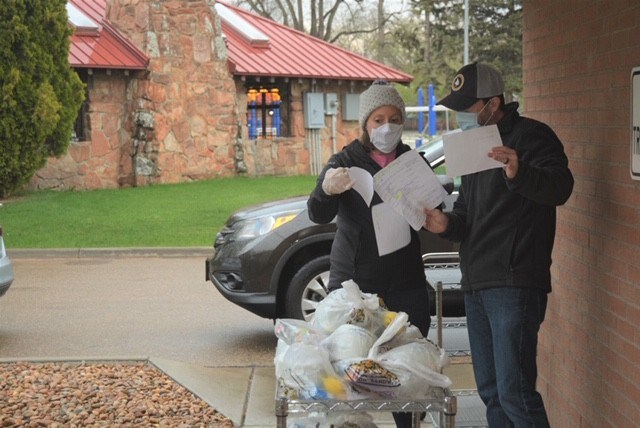While the Centers for Disease Control urge older adults to take extra precautions against COVID-19, these measures are bringing big changes in how seniors live. Many are becoming more isolated due to safer-at-home orders, restrictions on visitors and the temporary closure of resources.
Signs of this isolation are being seen throughout the community. Longmont Meals on Wheels had 71 new client sign-ups in March alone. Katie Wiser, the agency’s development and communications director, said that’s nearly 15% of its monthly count and more than double the clients from the same month a year ago.
Meals on Wheels staff are noticing changes in their clients, too. Wiser said “some of our homebound clients were already struggling with loneliness and isolation and that’s increased. Others are more anxious and don’t fully understand where their visitors have gone.”
Staff also is seeing caregiver stress when one of the members of a couple that cares for the other is suddenly lacking outside support, she said.
To help keep clients and older adult volunteers healthy, the agency’s meal delivery has been reduced to just once a week. Meals for seven days are provided at an arranged time through a touchless process and delivery volunteers watch from their cars to ensure meals are received. The lack of in-person contact has been replaced by tele-wellness checks.
Because of virus concerns, the agency is not currently accepting volunteers, but it is seeking donations to help with increased food and operational costs. Donations can be made at the agency's website.
The Longmont Senior Center also has had to change its service delivery model. While normally it acts as an in-person social hub and community resource, the center had to temporarily close on March 13. Social activities including fitness classes, tech support help, philosophy discussions, confidential support groups, and classes on navigating resources like Medicaid basics are now held virtually. Staff is kept busy planning the array of online activities.
Michelle Waite, Longmont’s Senior Services manager, said the online offerings are well received and those who are attending virtual programs are pleased with them. As word is getting out about the programs, which are available through the Senior Center’s website, attendance numbers are growing.
Waite also mentioned that for some people, there’s still a learning curve with using technology. She said “people are getting more accustomed to online activities, especially Zoom. Many had experience online and are getting more willing to learn.”
At senior residential facilities, the virus has brought a host of changes to daily life. Generally, facilities now restrict all non-medically essential visitors. Family and friend visits for residents often happen through windows at a distance. Any musical entertainment happens through windows as well.
In addition, most facilities have added a host of visitor entry rules. These include temperature taking on entry, mask wearing, adoption of other forms of personal protective equipment as necessary, reductions in social activities, and a stop to community dining.
The Bridge, a Longmont assisted living community, is dealing with an outbreak of COVID-19. According to Colorado Department of Public Health and Environment (CDPHE) data, at the time of publication it had 22 lab-confirmed cases of COVID-19 in residents and staff along with 13 probable cases and eight lab-confirmed COVID deaths. The state data is updated each Wednesday.
CDPHE defines an outbreak as two or more confirmed cases of COVID-19 in a facility or (non-household) group with onset in a 14-day period.
The Bridge implemented precautions against the virus and efforts are bearing fruit, according to Executive Director Shirley McNeff. Staff is starting to welcome back residents from hospital care, and returnees include a gentleman who is a 91-year-old World War II veteran, McNeff said.
McNeff praised her staff for their actions during the outbreak. She said that as residents were sent out for treatment and it was unknown if they would return, “staff stayed here and took care of the residents day in and day out. It was an extremely stressful time. I am in awe of what they did”
Statistics show the city’s care facilities have been hard hit by the virus. CDPHE data reveals outbreaks occurred at three Longmont senior group residences: The Bridge, The Peaks Care Center and Lifecare Center of Longmont. At the three facilities combined, 144 senior care facility residents or staff have tested positive or been shown probable for the virus. This is compared to 486 cases in Longmont, identified as of June 7 by Boulder County.
COVID-confirmed deaths total one at Lifecare Center and 16 at The Peaks.
Despite the challenges, the amount of support from the Longmont community has been a source of hope. Wiser expressed gratitude for how even hard-hit local restaurants have helped. Six area restaurants have worked with her agency to serve 7,600 meals during the pandemic.
McNeff echoed Wiser’s sentiment, sharing that support from families and the community was essential in boosting spirits at The Bridge.



